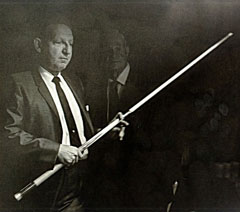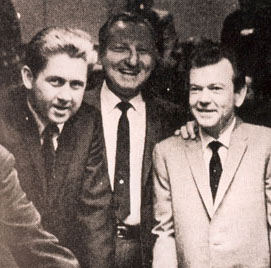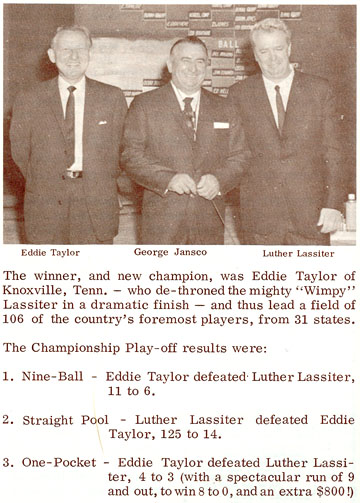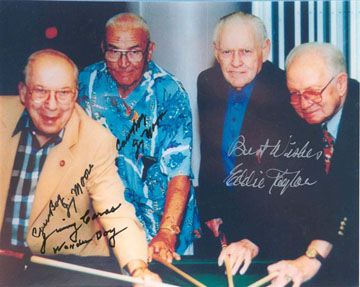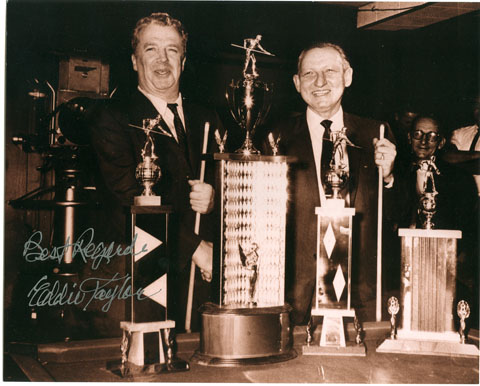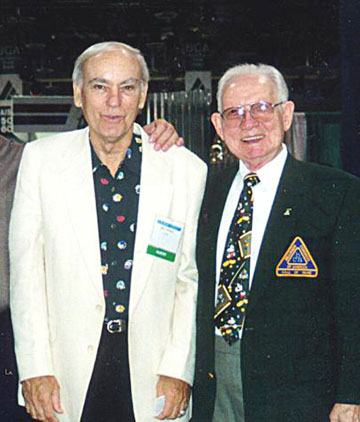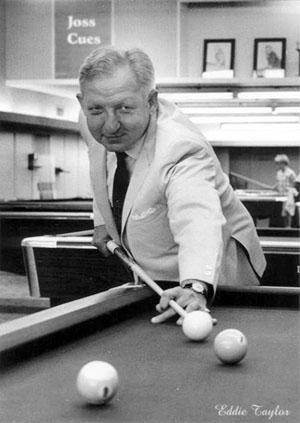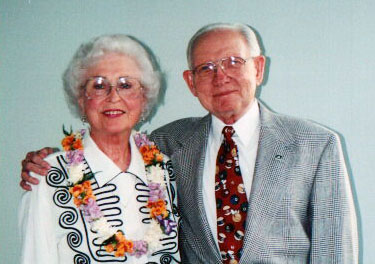 |
|
||||||||||
|
|||||||||||
|
1P: Could you tell us a little about how you developed into such a great Banks and One Pocket player? ET: My first game was pool of course, but then I got into Snooker when I was about 14 years old and I got to be a very good Snooker player, but there was no money in it. All of the money games around the South -- especially in Kentucky, Tennessee, Alabama and a couple other states -- all the money games were on Bank Pool. That's how come I wound up playing Banks.
1P: So you followed the money... ET: I was sixteen years old and I was playing very, very good Banks at that time. Earl Shriver and a guy they called Erie Fats -- who was a tremendous player of everything -- came to Lexington together, and that's when I wound up with Earl, which was my first inkling of One Pocket. Earl was really a top notch One Pocket player. He played everything good, but One Pocket was probably his best game. When I got with Earl Shriver, every time we didn't get any action in a little town or something, we'd play some One Pocket -- he was teaching me how to play. It was a long time before I got real comfortable with One Pocket, but the banks helped me tremendously.
1P: So when you got together with Earl you were only 16 and he was only 21, yet he was already a top One Pocket player -- so what's all this about having to be older to play good One Pocket? ET: Right, he was already a good One Pocket player at 21. But they didn't play that game everywhere. We hustled all over the country, and we just didn't run into it at that time, except Oklahoma City was a pretty big One Pocket town. I would say it didn't get real popular until the 50's.
1P: Where do you suppose Earl learned the game since he was only 21 and already so sharp at One Pocket? ET: I don't really know. I think he might have learned it from around Hubert Cokes or somebody like that. Cokes was one of the early, early players. I never had anyone ask that question before. I don't know exactly where he learned it, because they didn't hardly play it in the South. It was kind of like finding Straight Pool in the South -- you could drive all over for six months to a year and you'd never see a Straight Pool game. They played 9-Ball of course, but mostly they played Rotation. It was during the depression, and most of the time I never had enough money to play but one or two games, so you didn't want to play a game where somebody might luck out on you.
1P: It seems like Hayden Lingo got around a lot -- I know he was in Boston at one point. ET: The time I was around him for a couple of weeks was like 1950 or '51 -- I think I had a '50 Buick. 1P: Considering your ability to make long banks, did you tend to push the balls up table early in a game? ET: Yes, I also did that if I could, anytime it was a real tough game.
1P: In the early sixties. ET: Yeah. He won the One Pocket tournament in 1962 in San Francisco -- I think there were about 14-15 in it -- and he won that. I think I finished like third, and we played a little after that, but that's neither here nor there. Ed Kelley was another very good One Pocket player. That pretty much settles it up as far as the real good players that I can remember.
1P: Did you ever play Eugene 'Clem' Metz? ET: The first time I played Clem was in my hometown and I didn't know him. I played him either 8-6 or 9-7 and I had him down to his last dollar -- his last game -- but I didn't know that and I had to quit because I was having a bad problem with my left eye and left side of my nose. It was killing me, and I had to get somebody to take me home and put scalding towels on it. Anyhow, he told me this later, 'I only had one shell left.' But the next day he got even and I quit. I wanted to change the game, but he didn't want to change the game.
The next time we played, I had quit playing for 10 or 11 months. He came in and they called me and I said 'I can't play; I haven't been playing.' But I finally played and he beat me out of a couple of hundred dollars -- but that didn't matter at all. The next time I saw him was in Johnston City when the tournament was getting ready and all the action was going on. I hustled him to play some for a hundred or two but he wouldn't play, but we became good friends after that.
1P: How about Marcel Camp, did you ever play him? ET: Oh I knew Marcel real well. He came to my hometown and put on a show, and he was the US Snooker Champion at that time, and I played him an exhibition. We played two out of three and he beat me of course. At that time, Snooker was pretty much my best game other than Banks.
1P: He was a good One Pocket player, too, wasn't he? ET: We played Banks after the exhibition. The guy that owned the poolroom had given me the key to his place so we could get in there and play -- they closed at eleven o'clock. I was 3 or 4 games ahead when this policeman -- I guess he heard the balls -- banged on the door and we had to let him in, and he stopped us from playing. Marcel was ahead of me 6-1 in that last game. I said, 'Well the only thing I can do is tomorrow I'll give you 6 balls and I'll leave you a long shot like it was. That's the best I can do.' Anyhow I broke him the next day and it came out in the paper, 'Mr. Taylor and Mr. Camp played a very close exhibition match last night and the next day Mr. Taylor and Mr. Camp engaged in some Bank Pool and Mr. Taylor pocketed the coin.' I'll never forget that as long as I live.
1P: In the newspaper! ET: But Camp and I ended up good friends; I knew him well.
When I saw who it was, I was going to try to get some odds, but he said 'Oh no, I've heard all about you Eddie.' But now, those three guys want to bet but he won't let 'em. He wouldn't let 'em do anything but play for twenty dollars a game, and besides that he says, 'I'll play you some when the sun goes down.' I never heard that one before! I wasn't going to play, I got so mad that he wouldn't let them bet. They couldn't even bet on the side 'cuz the guy wouldn't let 'em. Anyway, we did play, and he won the toss and he broke the balls and he ran out, and broke the balls and ran out, and broke the balls and ran out; and he did that five straight games. The sixth game he made one on the break but he couldn't see the object ball so he had to kick, because we were playing shoot to hit the ball -- which I didn't like either, but he wouldn't play no other way -- so he kicked and hit the ball, but ended up leaving me a shot. Well I ran out that rack and then broke and ran out, and broke and ran out and broke and ran out, six in a row to go ahead and he quit. I cussed him out I was so mad; I had gone to all this trouble to drive up there. I said, 'You mean to tell me you're gonna quit? You never even missed a ball!' His name was Buck Bozeman, and he was a very, very good player, that for some reason you never heard so much about.
Finally I wound up playing this guy -- a banker from Du Quion -- I can't remember his name. First, I played him One Pocket 10 to 5. He said nobody ever beat him playing 10 to 5, but I beat him out of two or three thousand. Then I played him one-handed to his two at Banks, and beat him out of another two or three thousand -- not the same day -- and he told George Jansco, 'You know, it's worth a hundred dollars a game to see that son-of-a-bitch shoot with one hand.' At that time I was playing very, very, very good one-handed. I'd have played anybody in the world one-handed One Pocket or Banks. It was between me and Earl supposedly for the top one-handed One Pocket players.
One time, in Hot Springs Earl and I played for three hundred a game -- he was getting staked -- and he beat me five games in a row. The guy that was my backer at home was Charlie Brooks, a real high bookmaker, and he said, 'What do you think, Eddie?' I said, 'It don't mean a thing.' The money was half mine anyway that we were playing for 'cuz I had a pocket full of money. So he said, 'Well why don't you play him some for five.' And I said, 'I think that's a good idea.' So I said, 'You want to play for five, Earl?' And he said, 'Yeah', and we started playing for five and I beat him six in a row. That shows you how things go... 1P: So you and Earl both traveled together and matched up against each other. ET: Oh, that didn't matter at all to Earl. He was always after me because I was doing so well, but it always backfired. Another time he was backing a player against me where I got the break and the first shot and I was playing him 9 to 3, but I learned how to do that, so I even got him on that.
1P: So you trapped him on a bank that was a kiss. ET: Yeah, I never said it like that, but that's actually what happened.
1P: But that was the way you defended against the bank -- you left it so it was a kiss. ET: Yeah, but all-in-all Lassiter turned out to be a very good One Pocket player.
1P: Eufaula? ET: Yeah, 'Eufaula' [Glen Womack]! He gave me a ball and I beat him out of quite a bit of money. That came about because a while earlier, back in Fort Worth, Texas, I had played Eufaula 9-ball and beat him out of six hundred, so he wanted to play me One Pocket. So I played him One Pocket and he beat me out of four hundred. So then I got a ball off him in Hot Springs, and of course I did pretty well.
1P: Do you have any advice for players trying to improve their One Pocket game? ET: I try to tell everybody, anytime you are banking an object ball close to the cushion, you don't draw the ball. If you draw the ball, you'll get a kiss. I remember showing this shot to several of the guys in Tulsa when I was guest of honor there. Cory Deuel was there and he said, 'That's impossible, Eddie, how are you going to keep from kissing that ball?' So I said, 'You just have to forget about that'. So I set it up and I shot it one-handed and made it, and he said 'How in the hell do you not kiss that ball?' So I showed him how, and finally he made it and said, 'I see why they call you the greatest bank pool player.'
I used to make that shot four out of five times. Now I can't make it anymore but I get Buddy Hall to shoot it. I set it up and he shoots it. He knows how 'cuz I showed him how to do it. Of course he makes it every time, like I used to when I could see.
1P: So you helped him out with his Banks and his One Pocket. ET: Yeah, he always tells everybody that. Actually Buddy is a lot like Lassiter, that wasn't supposed to be a One Pocket player, but Lassiter became a real good One Pocket player. He wasn't to start with, but he got so he was a very good One Pocket player. I had a hell of a time with him. 1P: And like you weren't supposed to be a Straight Pool player... ET: Well, it's like Beenie [Bill 'Weenie Beenie' Staton] said, 'If Eddie had born in NYC there'd have been a lot of Straight Pool players leaving.' Actually, when they finally invited me to the World's tournament in NY -- I told my wife, 'They'll probably need some towels to wipe up the blood.' Anyhow, Irving Crane was telling me this story. I had won one match and lost five and Crane said that he and Lassiter were talking to the promoter, and the promoter said, 'Hey, I thought this Taylor was supposed to be a hell of a player.' Crane told me that Lassiter spoke up and said, 'Don't worry about Taylor; when the smoke clears, Taylor will be there.' I won my last eight in a row, so I finished 9-5. I would have finished third or forth -- I finished seventh -- but I didn't have any balls in those five games that I lost.
1P: You mentioned playing one handed; there was a guy from the Boston area named Andrew St. Jean who was supposed to be a strong one-handed player. ET: I didn't know him, but you know who told me that he was a tremendous one-handed player? Fats told me, and another guy named Dayton Omstead -- and Dayton was a pretty damn good three-cushion billiards player. He told me that he played St. Jean even up, and he was running three and four and going five rails and whatever, playing one handed. Of course he didn't play Banks because they didn't play Banks in that part of the country. I never got to meet him, but I'd have gone against him. At one time I don't think anybody could have beat me playing one-handed One Pocket or one-handed Banks.
1P: It sure does sound like you were a very strong one-handed player... ET: If you ever talk to Mike Massey, the trick-shot player -- he was from a little town just outside Knoxville -- he used to come watch me play. We used to play partners a lot and if you got eight by yourself, you collected from everybody. I had to play one-handed, and this was with the best players in Knoxville, and I usually won -- I don't remember actually losing -- I won pretty regularly. Mike says 'I remember seeing you bank those balls 6 or 7 at a time one-handed.'
One time with Titanic Thompson -- I'm sure you've heard of him -- well Ti was in town and he saw me playing a guy that was a bookmaker playing for four hundred dollars a game, playing him 8-5 one pocket and I was playing one-handed with no tip on my cue. Now what happened was, I drew the ball about 6-7 inches with no tip, one-handed. So he said 'They'll be no more of that', and he got a glass of water and I had to dip the stick in the water each time before I shot, but I still beat him out of four thousand. Well Titanic saw that and said, 'That was the most amazing thing I've ever seen in my life!'
The second night I was there I played a guy from Chicago that owned a bar on the main street, and they said he was a pretty good player. I played him one-handed and beat him out of six thousand.
1P: That was at One Pocket? ET: Yeah, my one-handed to his two. I beat him five games ahead and when I was going over to pay the tab he asked 'How much are you winner, Taylor?' And I said, 'Eight hundred,' because I was thinking I was four games winner. So he said, 'I'll play you one for eight.' And I said, 'Get it up.' We played for the eight and I won and I said, 'I guess you want to play for the sixteen.' And he said, 'F**k you, Taylor, I'll play you some for five.' So I wound up beating him out of six thousand.
At the same time these guys that were playing in the World's Tournament -- there were twelve of them -- were playing for the top prize of $2500. Mosconi won it and got $500 extra for high run.
1P: So you made twice what they did, playing one-handed. ET: That's what I'm saying; I'm sure those guys that were watching this had their mouths watering. It's such a shame that pool has always been so cheap. For some reason -- they'll put pigeons, horseshoes and anything in the world that you can think of in the paper, but not billiards and pool. It's really pitiful, because pool is a hell of a sport. I mean it takes some real finesse. Pool is not an easy game. I won the Stardust, which was eight thousand and something, and they had in the write up 'The largest prize of all time.' That was 1967. It's not much better than that today. It's really pathetic. I feel so sorry for those players.
Click here to read Part 2 of Eddie Taylor's interview On Fats, Mosconi, Frankie Boughton and others Unless otherwise noted, all photos courtesy Grady Mathews and Mary Bennet -- all rights reserved. If you would like to comment on this article, or add your own Eddie Taylor story, you can Contact Us, or visit the OnePocket.org Message Board. If you have not already signed up, you will need to register in order to post a message.
|
Web Design by J Maze Design






